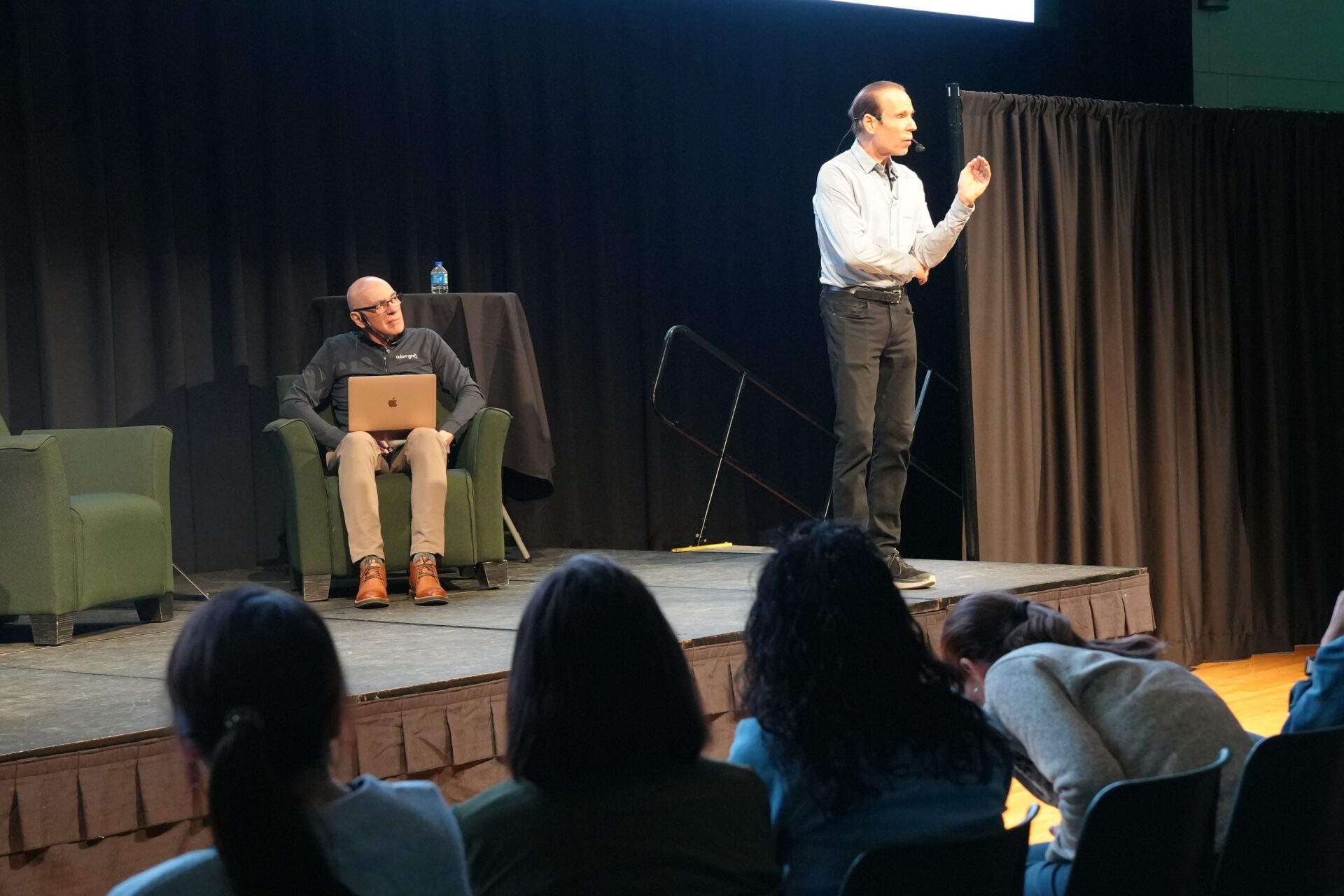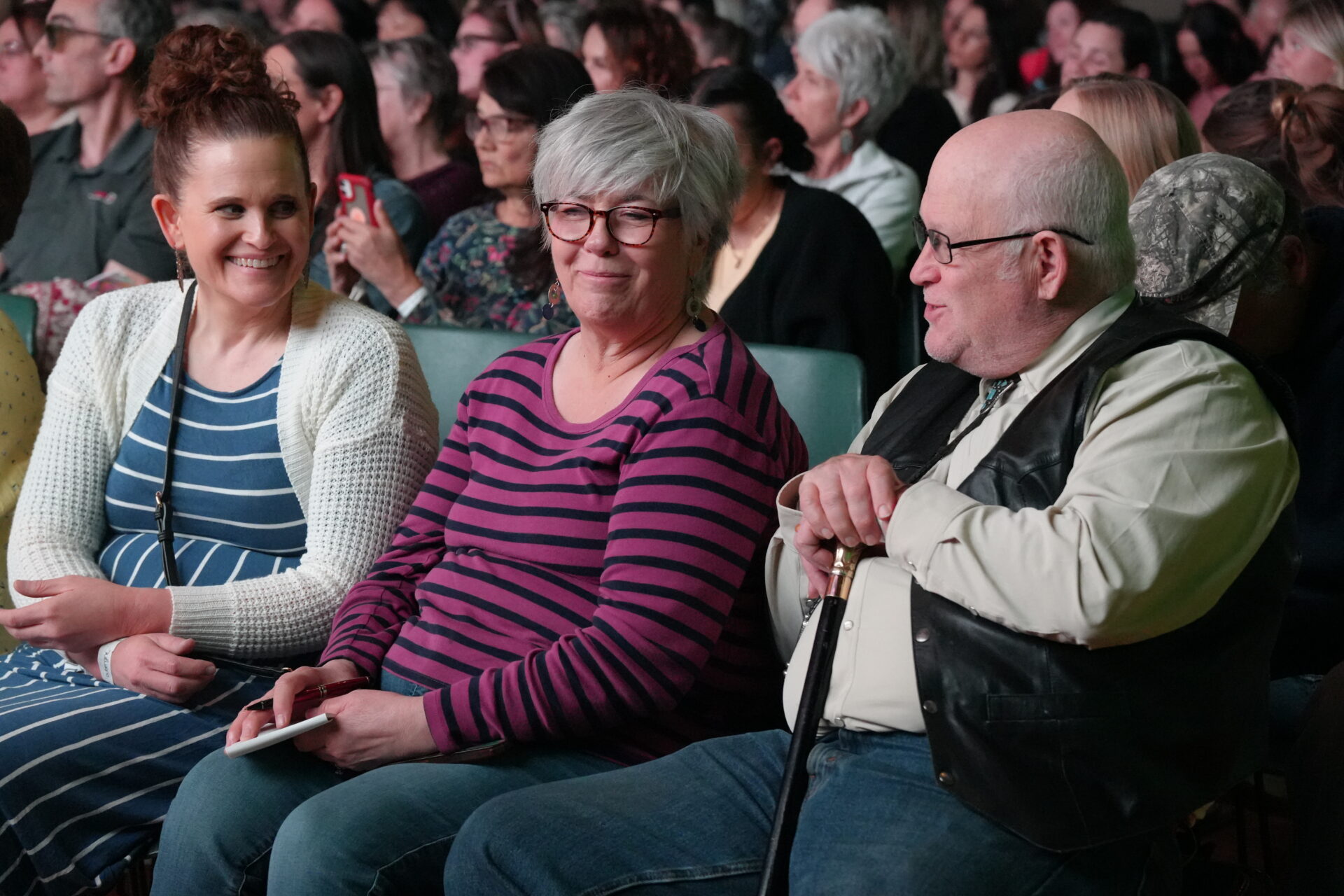“The American diet is dangerous,” Dr. Joel Fuhrman told a crowd of 900 on Thursday, April 11 at Utah Valley University’s Sorenson Center.
Fuhrman is a seven-time New York Times bestseller, loves the Utah ski slopes and is a graduate of the University of Pennsylvania School of Medicine.
At the event hosted by local restaurant chain Aubergine Kitchen, Fuhrman presented international research and studies warning of the dangers of eating the typical American diet.
According to Fuhrman, the typical American diet consists largely of processed foods that reduce the quality of life and lifespan of the average American.
The leading cause of death in the United States is heart disease, according to the CDC. Fuhrman said Americans are feeding themselves toward heart disease, as well as cancer and dementia.
“More greens, more beans, more nuts and seeds,” Fuhrman said is the best way to prevent heart disease, cancer and dementia. “They tune out the unhealthy foods you crave and fill you up.”
Fuhrman said the best way to live healthier and longer is to eat nutrient-dense foods, foods that come straight from the earth. However it has been found that only about 14% of the average American diet is unrefined, unprocessed plant based food.
“My goal is to help all of you become nourishers,” Fuhrman said. “Which means you’re eating to live longer to protect your health, which increases your creativity, mental function and physical health.”
A nutritionist is someone who follows a diet rich in nutrients and plants. Fuhrman offered four key pieces of advice, relevant to college students and those looking to improve their health.
- Eating more nutrient dense foods will fill the body faster, regulating metabolic rates and encouraging eating only when hungry.
- Focus on green vegetables, especially cruciferous vegetables like broccoli, Brussels sprouts and kale.
- Beans are a very effective preventative food, helping to prevent heart disease, dementia and cancer. If beans are difficult to digest, start with smaller portions and increase bean intake slowly over time.
- Oils, such as extra virgin olive oil, are better to consume than animal products, such as butter, and better than no oil intake. However, it is better to eat nuts and seeds than oil. “You don’t see oil growing on trees. You have to eat real food,” Fuhrman said.


Marianne Chambers is a sophomore at BYU who attended the event. Although she said she is not a nutritionist or nutritionist at all, she wants to be more health conscious.
“I have to be realistic with myself, like the college culture in particular. I’m not going to choose not to eat a cookie at a party,” Chambers said.
However, Chambers said she is going to set small goals for herself, such as eating leafy greens at every meal and adding more beans to her diet.
“I couldn’t be a nutritionist tomorrow, but the key is small steps and consistency,” Chambers said.
Elcio Zanatta, CEO of Aubergine Kitchen, said he hoped Fuhrman’s move to Utah for this event would encourage people like Chambers.
Zanatta first got to know Fuhrman through one of Fuhrman’s books, “The End of Heart Disease.” Several years later, the two bonded over their shared goals of bringing healthy, plant-based food to as many people as possible.
“Our purpose from the beginning has been to help people make changes in their lives for the better with real food,” Zanatta said.
Aubergine Kitchen started in 2014; now, they’re celebrating their 10-year anniversary with 10 locations in Utah, with their first out-of-state restaurant opening in Mesa, Arizona in September.
“Food is everything that gives you power, energy,” Zanatta said.
That’s critical for college students, those pursuing academics and anyone in the know, Zanatta said. He is a first generation American and his family are BYU graduates.
To make sure he serves healthy food to his family and community, Zanatta said he always asks, “Would I let my grandchildren eat here?”
This was the first event of its kind hosted by Aubergine Kitchen. According to Zanatta, it won’t be the last.
BYU sophomore Hailey Allphin found out about the event because she and her mom are big fans of Aubergine Kitchen. Alphin said she was excited to learn more about how she can be more mindful of the food she puts in her body.
“We have so much power to fuel our bodies through food and nutrition. It affects not only our physical health but our mental health. The two are so interconnected,” Allphin said. “I don’t think we always realize the power we have.”
Allphin said she wants to be in tune with her body and listen to what it needs.
“With college life it’s so easy to be on the go and prioritize convenience over nutritional value. But sometimes we underestimate ourselves because that hinders our academic performance,” Allphin said.
BYU students can learn more about nutrition and receive free nutrition consultations through the Women’s Services and Resource Center. Consultations are free for all.
